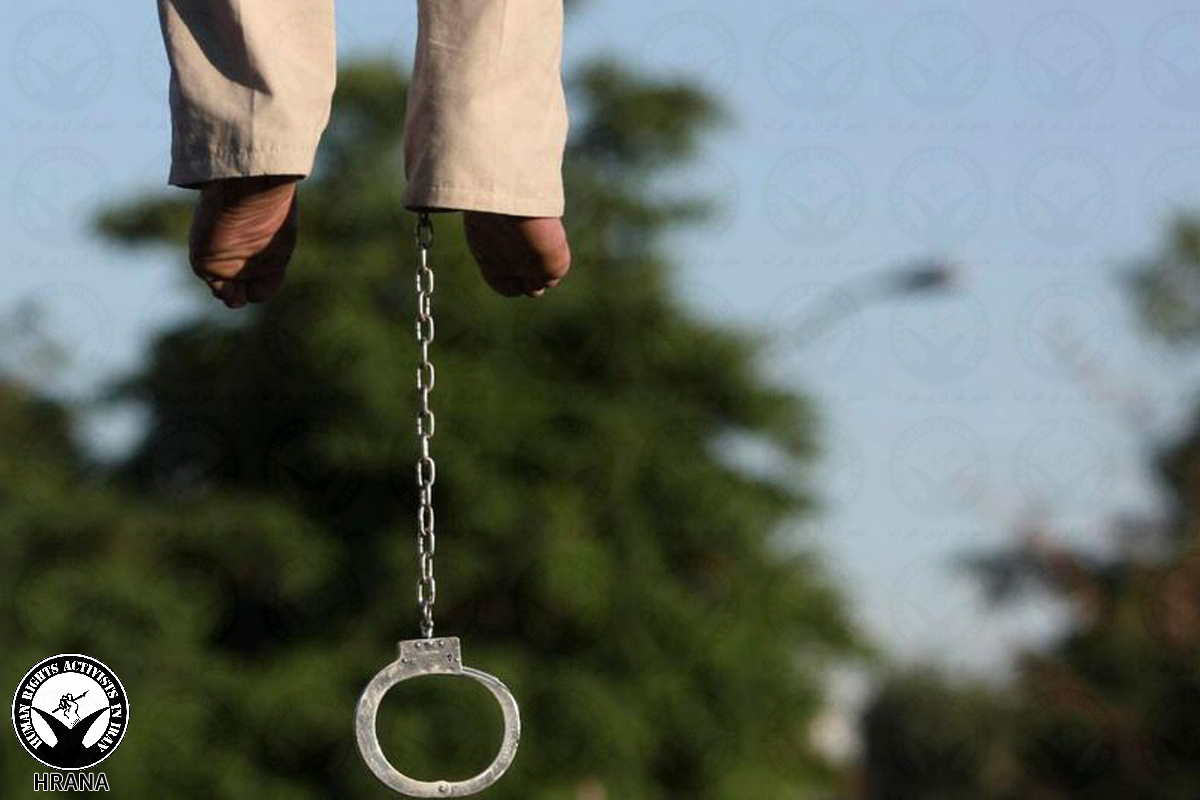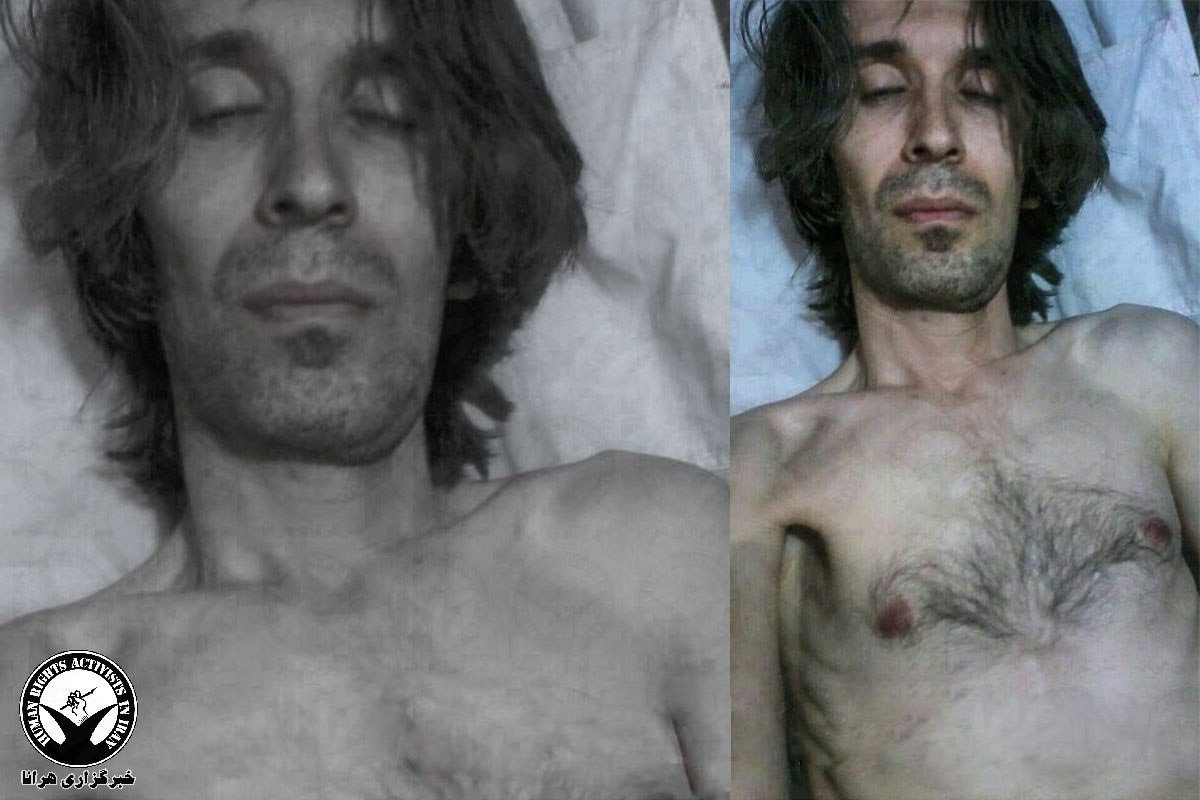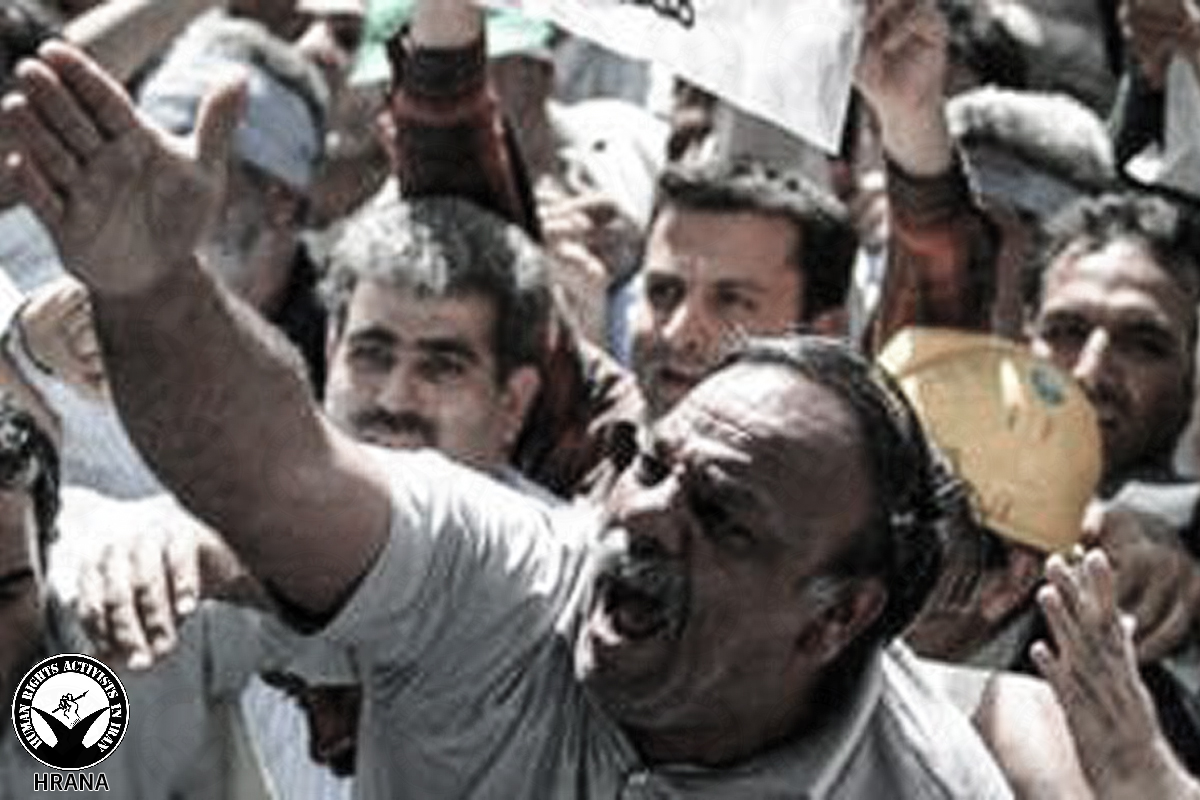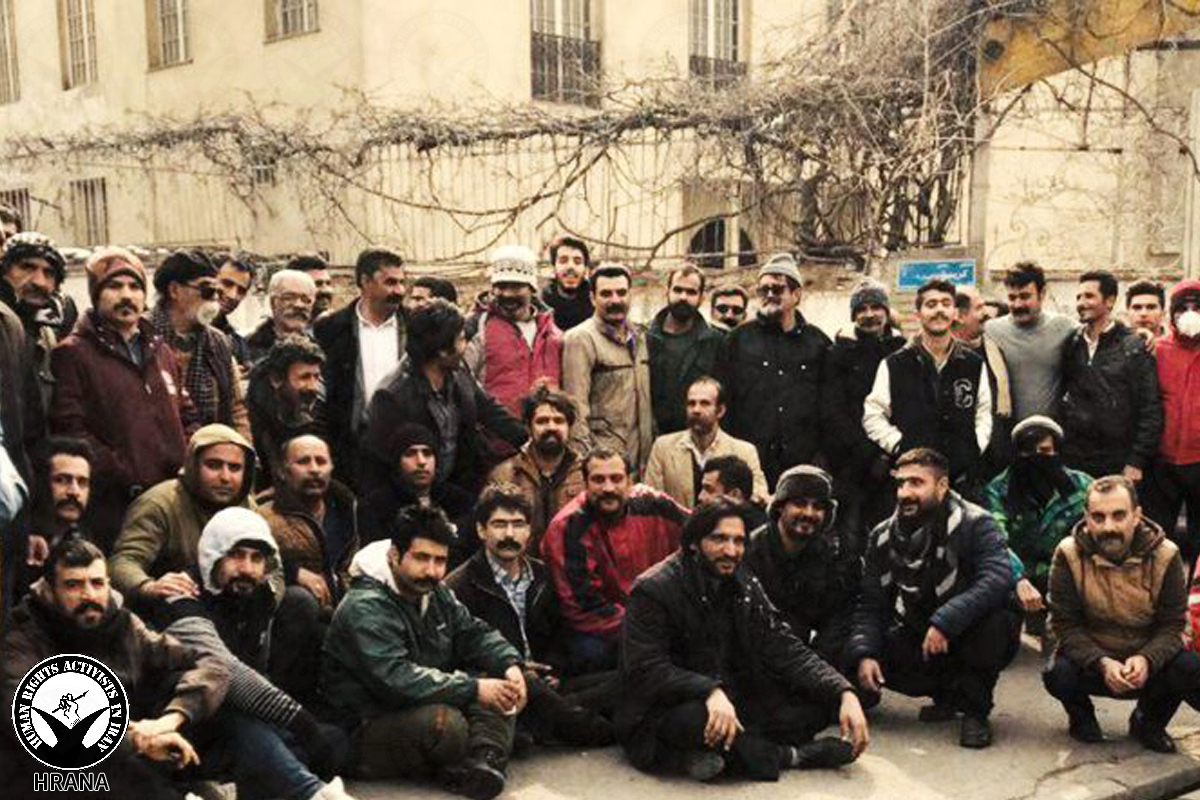Human Rights Activists News Agency (HRANA)- Ramin Hossein Panahi, a political prisoner on death row in Rajai Shahr (Gohardasht) Prison, waits shackled hand and foot in a solitary confinement cell.
Hossein Panahi stitched his lips together and went on hunger strike August 27, 2018, to protest his death sentence and the infringement on his basic rights by authorities. A source familiar with his situation told HRANA, “Rajai Shahr officials forcibly pulled the stitches from his lips and transferred him in handcuffs and shackles to solitary confinement in Ward 5, the known destination of prisoners whose execution is imminent.”
Hossein Panahi, who suffers from severe renal problems and other injuries, is unlikely to receive the medical attention he needs in his present state.
Hossein Panahi’s lawyers previously issued a statement announcing their client’s hunger strike and the motivations behind it, and asking judicial authorities to facilitate their client’s access to the legal rights of appeal and request for clemency.
Ramin Hossein Panahi was sentenced to death by Branch One of the Revolutionary Court in Sanandaj (Iranian Kurdistan) on a charge of “Acting against national security” on January 16, 2018. The sentence was upheld in mid-April by the Supreme Court before being forwarded to the Execution of Sentences Unit.
Hossein Panahi’s lawyer Hossein Ahmadiniaz reported in June that his request for a retrial had been denied.
Previously held in Sanandaj Prison (300 miles west of Tehran), Hossein Panahi was transferred to an unidentified location on August 13, 2018, before being transferred to Rajai Shahr Prison (30 miles west of Tehran) for reasons unknown.
Author: admin-hr
Ahwazi Arab Poet Abbas Torfi Detained in Mashhad
Human Rights Activists News Agency (HRANA) – On Thursday, August 30, 2018, an Arab poet and activist was detained in Mashhad after attending a private poetry reading. Security forces produced no warrants at the time of his arrest.
HRANA verified the identity of the detainee as Abbas Torfi.
Torfi is actively involved in Arab poetry, culture, and literature. The reasons for his arrest remain unknown. No information is currently available regarding his whereabouts or conditions post-arrest.
IRGC Detainee Back in Zahedan Prison Custody
Human Rights Activist News Agency (HRANA) – On the evening of Thursday, August 30, 2018, Abubakr Rostami, a political prisoner on death row, was transferred to the General Ward of Zahedan Prison after being sequestered in an IRGC detention center for two days.
Rostami was originally taken from Zahedan’s Ward 4 into IRGC custody for reasons that HRANA has not yet been able to confirm.
Rostami was among a group of political Zahedan prisoners who addressed a letter to UN Special Rapporteur Javaid Rehman, imploring him to advocate for political prisoners’ rights. Rehman is the UN’s designated expert on the human rights situation in Iran.
In an open letter co-written by Bandeh Chakerzehi and Sajjad Baluch — the two arrested with him on September 16, 2015 in Pakistan – Rostami proclaimed their innocence, stating the IRGC and Intelligence Agency exerted physical and mental torture on them on charges that were “bogus”.
In the letter, Rostami wrote of the trip to Pakistan he was planning in anticipation of making arrangements for continuing his studies [abroad]: “Due to border limitations, I was forced to travel through Pakistan to get to [another] foreign country, but I was arrested midway and handed over to the IRGC,” he wrote.
A second-year medical student at Zabol University of Medical Sciences, Rostami has spent the past three years in prison. In August 2017, along with Chakerzehi and Baluch who were on trial for the same case, he was sentenced to death by the Revolutionary Court of Zahedan on charges of “Moharebeh” (enmity against God) and “Acting Against National Security through Cooperation with Opposition Groups”. No further details on their case or charges were available.
*Zahedan is a county in the Sistan and Baluchestan province.
Political Prisoners Pen Condolences in Wake of Deadly Forest Fire
Human Rights Activists News Agency (HRANA) – Four political prisoners in Rajai Shahr Prison (a.k.a Gohardasht), Karaj, have written an open letter to express compassion over the deaths of four environmental activists who lost their battle with the forest fires of Marivan, located in Kurdistan in western Iran.
The deceased activists — Sharif Bajour and Omid Kohnepoushi, both members of Chya Green Society, and Mohammad Pazhouhi and Rahmat Hakiminia, members of Marivan Environmental Office — were fighting wildfires near the Iraqi border in Salasi and Pileh. Marivan’s county governor revealed their cause of death to be asphyxiation due to smoke inhalation.
Two other activists, Mokhtar Aminejad and Mohammad Moradveisi, were injured in the same fire.
Below is the full text of their letter, translated into English by HRANA:
It is not my lot to die a natural death;
Better for the holy grail than in blissful sleep,
And on truth’s command, I welcome that death
which releases freedom from chains of darkness
It was with great shock and sorrow that we heard the news that Sharif Bajour and the others had perished; grief engulfed us like flames. We struggle to reconcile with the sad reality that the chestnut oaks of Zagros Mountain (1) have lost a dear friend.
Sharif Bajour, so appropriately named (2), leaves the Zagros bereft. He was a true friend to the mountains, plains, and forests of Kurdistan. Had he lived anywhere else on earth [but here], his death would have roused the lament of a nation. If the state-run media shrouds his death in silence, he remains an eternal hero in the hearts of the people. His loss leaves a void in the heart of his nation, who has seldom known so noble and gentle a soul as his. His new and creative path of resistance is his legacy.
Bajour’s resistance involved guarding the chestnut oaks of Zagros with his body and soul, biking for the cause of peace on earth, and staging a hunger strike outside the media spotlight.
As political prisoners of Gohardasht prison, we express our condolences to the families of this respectable man, as well as to the families of the other Zagros fire victims, whose names we regrettably do not know. We extend our deep sympathy to his friends and comrades from the Chya Green Association, to all those who care about the environment, and to the people of Kurdistan. They have lost some of the most honorable men of their time. Much like the fire that took their lives, the loss of these beloved souls has burned our spirit.
Arash Sadeghi,
Loghman Moradi,
Zanyar Moradi,
Saeed Shirzad
—-
(1) Mountain range in western Iran and scene of the fatal forest fire
(2) Sharif means “honorable” in Arabic
Rajai Shahr Executions Continue
Human Rights Activists News Agency (HRANA) – At least two death row prisoners in Karaj’s Rajai Shahr Prison were executed in the early morning hours of Wednesday, August 29, 2018.
HRANA was able to confirm the identities of the executed prisoners: Mojtaba Asadi, who was detained in Ward 3, and Vahidollah Loghmani, age 54, reportedly from Afghanistan. Asadi was sentenced to death on a charge of murder, and Loghmani for a charge of armed drug trafficking.
HRANA was also able to confirm the identity of two prisoners from a group of at least five who were transferred to solitary confinement on Tuesday, August 28, pending execution: Mojtaba Asadi of Ward 3 and Shamsali Abdollahi of Ward 10.
When the plantiff in Abdollahi’s case permitted his execution to be delayed until further notice, he was returned to his prior Ward.
The fate of the two other prisoners is not yet known. If they were put to death, their executions have not been announced by the state-run media as of the time of this report.
An annual report published by the Center of Statistics at Human Rights Activists in Iran (HRAI) states that more than 60% of executions, called “secret executions,” are not disclosed by authorities. According to registered data from 2,945 reports by the Statistics, Publications, and Achievements Division of HRAI, in the past year (from March 21, 2017, to March 18, 2018) at least 322 citizens were executed and 236 others were sentenced to death in Iran. Figuring among these are the execution of four juvenile offenders and 23 public hangings.
Suffering from Cancer: Arash Sadeghi’s Medical Report in Rajai Shahr Prison
Human Rights Activists News Agency (HRANA) – Rajai Shahr prisoner Arash Sadeghi, who despite severe physical symptoms was repeatedly denied medical treatment, has been diagnosed with bone cancer, a source close to the matter told HRANA.
Sadeghi, a civil rights activist, received his diagnosis after finally being transferred to a hospital last week for medical testing on a tumor in his arm. Hospital officials confirmed the tumor to be malignant, identifying it as chondrosarcoma.
Hospital oncologists recommended Sadeghi be immediately admitted to the hospital for further exams, biopsies, and pre-op procedures, HRANA’s source revealed. The source added, “The tumor is located in his right arm under the clavicle and scapula. Doctors have stated that the removal of the tumor and subsequent examinations will determine whether or not further surgeries or [post-op preventive] chemotherapy will be necessary.”
Chondrosarcoma is the most prominent malignant bone cancer in youth, affecting an estimated 100 patients per year in Iran. In this type of cancer, malignant tumors are composed of cartilage-producing cells that may arise spontaneously or from pre-existing benign tumors, most commonly in the pelvic, hip, and shoulder regions. Its cause is still unknown.
Pain and swelling are the primary symptoms of this type of bone cancer in its advanced stages. Unresponsive to radiotherapy and chemotherapy, chondrosarcoma is most often treated with surgical excision of the tumor and its marginal cells. Patient prognosis for this specific type of cancer has improved dramatically in recent years.
On July 21, HRANA reported on Sadeghi’s transfer to a hospital in Tehran under heavy security control. Upon his arrival, hospital officials refused to admit him, stating the doctor was not available to see him; he returned to the prison without receiving medical attention.
Subsequently, Amnesty International issued a statement demanding immediate action be taken to attend to the medical needs of Arash Sadeghi, as he had been diagnosed with a potentially malignant tumor in his elbow.
Arash Sadeghi was sentenced to 19 years’ imprisonment by Tehran’s Revolutionary Court. In December 2016, Sadeghi staged a 72-day hunger strike to protest the continued imprisonment of his wife, Golrokh Iraee.
Baluchi plight laid bare in exiled prisoner letter
Human Rights Activists News Agency (HRANA) – Three Baluchi political prisoners exiled to the northwestern city of Ardabil wrote an open letter in critique of the Iranian authorities and to raise public awareness about the plight of their people.
From Ward 7 of Ardabil Central Prison, Mohammad Saber Malek Raisi, Shirahmad Shirani, and Noor Ahmad Hassanzehi wrote of dysfunctions plaguing the infrastructure of the Sistan and Baluchestan province, and of government inaction against the severe desiccation of Hamoun Lake.
Their letter concludes with a poem entitled “Friendship Is Our Long-Lasting Treasure,” which celebrates the unity among the different ethnicities of the Sistan and Baluchestan province.
Their letter is below, translated into English by HRANA:
Greetings, our dear Sistani peoples, especially those around Hirmand and Hamoun,
As exiled Baluchi political prisoners, we regard it as our duty to declare solidarity and express support to you, noble and kind fellows, through these troubles of our day. From the bottom of our hearts, we wish the best to you and to all the peoples of our province. We wish you emancipation from dictatorship.
How inconceivable it is to live this way! With border regions barren of water, electricity, gas, housing, employment, and of basic amenities like schools, roads, heating and cooling, toilets, and now, of the natural right to breathe; what is left to do but to survive, but to suffer? And for how long?
Clean air is the unconditional and vital right of all living beings. Despite this, some — who pursue personal and organizational profiteering, are guilty of mismanagement or carelessness, or persist in the mass theft of subterranean marine resources — have blighted this ancient erudite land with chaos and suffering. This birthplace of brave souls like Rostam, Sohrab, and Yaqub Leith; this place of Iranian linguistic and social renaissance.
How can we bear to see Sistan, the fertile crescent of ancient Iran, abandoned to a fate steered by those who caused this chaos, i.e. the regime and its agents?
The carelessness and profiteering of the regime’s authorities must cease its exploitation of the immense natural, cultural, and ethnic wealth of Sistan and Baluchestan, by ceasing the stripping of its precious gold and ore mines and the closing of its borders, the sole gateways to hope for the regions’ people in this era of poverty and destitution. Their job is not to gamble Sistani lives. You are the authorities! It’s your duty to heal the disorder you’ve caused.
What have you done all these years to restore Hamoun Lake and its wetlands? What have you done besides spend billions of rials on a border wall, fence, moats, towers, watchtowers, and other border controls? How much have you spent on the welfare of this region’s people? How much on the restoration of Hamoun Lake and wetlands, equal parts a cause and excuse for our insecurity? How will you restore hope and comfort to these poor and wronged Sistani farmers and fishermen? With lies, with promises?
You, our fellow Sistanis, people of our province, should know that we, the Baluchi people, irrespective of the regime and its schemes, will stand up to any abuse that violates your rights. We will condemn it. We will put our lives on the line for you.
Mohammad Saber Malek Raisi, Shirahmad Shirani, Noor Ahmad Hassanzehi
Exiled Baluchi political prisoners,
Ward 7 of Ardabil Central prison
August 30, 2018
Sugarcane Industry Strike Going Strong
Human Rights Activists News Agency (HRANA) – On Thursday, August 30th, workers of the Haft Tapeh Sugarcane Agro-Business (HTSA) organized a protest gathering in front of their factory’s management offices, marking the 13th consecutive day of their strike.
HRANA reports that workers’ representatives sought to conclude the strike under pressure from authorities, but workers were dogged in their resolution to strike until the company agrees to meet one of the workers’ chief demands: to re-nationalize.
When HTSA was sold to the private sector in early 2016, it caused a string of delays in worker payments that have yet to be resolved.
Workers have declared strike multiple times to demand payment of back wages, which authorities from HTSA and the city of Shush have committed but thus far failed to deliver.
In recent months, worker anger was only exacerbated by news that HTSA sections have been sold off to outside companies, reportedly founded by close associates of major HTSA shareholders.
Imprisoned Dervishes’ Sit-In Violently Raided; Transferred to Solitary Confinement
Human Rights Activists News Agency (HRANA)- On Wednesday, August 29, 2018, Great Tehran Penitentiary guards used batons, electrical shock, and tear gas to break up a sit-in of *Dervish prisoners that had been in effect in Ward 3 since June 13th.
The Twitter account of Majzooban Noor — who publishes a news feed on Dervishes, a religious minority — reported that prison officials filtered the other detainees out of the quarantine area before charging the Dervishes’ sit-in. They welded the gate of the prison yard, leaving a number of Dervishes surrounded. Guards used tear gas to keep at bay another group of Dervish prisoners who were attempting to break the siege.
A Dervish who took part in the sit-in explained in an audio file that “instead of heeding our ultimatum to release the female Dervish prisoners of Gharchak, they jarred us awake early in the morning and broke up the sit-in. The guards divided us into two groups, taking one to the prison hall and the other to the guard stand. One group of Dervishes broke a door to join the others. The guards countered by beating them severely. Our condition is troubling.”
Hours after the assault, all of the Dervishes imprisoned in Ward 3 were taken to solitary confinement cells. Shortly after, the following Ward 4 Dervishes protesting the attack on their Ward 3 comrades were also transferred to solitary confinement:
1. Ali Mohammad Shahi 2. Heydar Teymouri 3. Hassan Arab Ameri 4. Saeed Doorandish 5. Reza Yavari 6. Reza Sigarchi 7. Mohsen Azizi 8. Mehdi Keyvanloo 9. Mohammad Sharifi Moghaddam 10. Salehodin Moradi 11. Sina Entezari 12. Hadi Shahreza 13. Ahmad Iranikhah 14. Mehdi Mardani 15. Rassoul Hoveydah 16. Kianoosh Abbaszadeh 17. Mojtaba Biranvand 18. Abbas Dehghan
Dervishes in Ward 2 also protested the violence of the raid by tying their hands with a white cloth.
These events unfolded during a visit from Mostafa Mohebbi, Director General of Prisons of Tehran province, who had come to see the prison following reports of its poor conditions.
The sit-in was sparked by a violent attack on female Dervish prisoners of Gharchak Prison on June 13, 2018, in which they were assaulted with batons and shocked with electrical weapons before being dispersed among different wards. In protest, these female Dervishes declared a 16-day hunger strike, while male Dervishes organized the sit-in in a display of solidarity. HRANA previously published the identities of those who attacked the female Dervishes.
The crackdown against Dervishes intensified in late February 2018, when police forcibly disbanded a protest they had organized against ramped-up surveillance of their leader.
The February 2018 clash ended in the injury and arrest of a number of Dervishes. While Iranian Judiciary authorities estimated the number to be around 300, HRANA published the names of 324 and estimated the number to be considerably higher.
Human Rights Watch also tweeted about the February 2018 crackdown, and revealed in a recent report, “Since May 2018, revolutionary courts have sentenced at least 208 members of the religious minority to prison terms and other punishments in trials that violate their basic rights”.
—-
* There are various divisions among Dervishes in Iran. In this article, the term “Dervish” refers to Nematollahi Gonabadis, who in recent years have declared themselves followers of Twelver Shia Islam, the official state religion in Iran. On March 8th, Noor Ali Tabandeh, the spiritual leader of the Gonabadi Dervish faith, published a video stating that he is not permitted to leave his residence in Tehran.
Ebrahim Nouri’s Imprisonment begins in Evin’s Quarantine Ward
Human Rights Activists News Agency (HRANA) – Ebrahim Nouri, an Azerbaijani civil rights activist from Ahar, has entered the first days of a six-month prison sentence for a case opened against him in 2016.
After being arrested during a gathering at Babak Fort, he was denied the right to post bail and imprisoned in Ward 209 of Evin Prison on July 2, 2018. An informed source told HRANA that Nouri contacted his family from Ward 209 at that time, informing them of the $29,000 USD bail set for him.
In July, HRANA reported on Ebrahim Nouri’s arrest by security forces at the Babak Fort gathering.
In a press release on August 11, 2018, Amnesty International called the recent arrests of Azeri people “arbitrary” and unlawful, and demanded the immediate release of Ebrahim Nouri and all other individuals detained for their participation in an Azerbaijani Turkic cultural gathering.
Stemming from a 2016 arrest, Nouri was sentenced by Branch 1 of the Criminal Court of Ahar to his current sentence of 6 months’ imprisonment, on a charge of “Propaganda against the regime”. In February 2018, this sentence was confirmed by Branch 26 of the Appeals Court of East Azerbaijan Province, under the supervision of Mikaeil Khoubiarpour.
Nouri, a law student, has a record of being detained for civic activities, beginning in 2005 when he was arrested and interrogated by an IRGC Intelligence unit. In 2009 he was sentenced to ten months’ imprisonment, suspended over five years, on a charge of propaganda against the regime. He was arrested again by security forces on January 17, 2013, and released on a bail of approximately $24,000 USD five days later.














